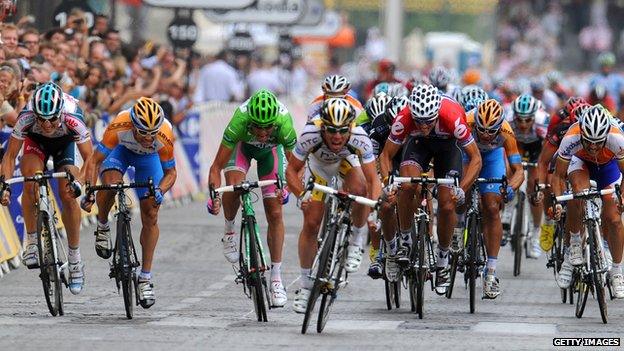Tour de France's Grand Depart in £2.3m shortfall
- Published

The report said "the estimate did not fully understand the scope of the event"
The organisers of the Tour de France's launch in England this summer have underestimated the potential cost of the event by £2.3m, a report claims.
An internal review has looked at the contract to provide barriers, communications, first aid and other aspects of the major public event.
The document recommends Manchester-based WRG should be given the contract.
But the company's bid is priced at £4.5m - an increase of £2.3m on the amount in the original budget.
World's biggest
"The estimate did not fully understand the scope of the event and therefore the quantity of resources has significantly increased," the report states.
"It did not take into account the requirement to transport resources around Yorkshire, Derbyshire and Rochdale, and due to the distances and rural locations involved the rates have increased."
The 2014 Tour de France Grand Depart starts in Leeds on 5 July with a stage that runs to Harrogate.
The second leg sees the race move from York to Sheffield on 6 July, before the entourage moves south to Cambridge, Essex and London the following day.
The report was prepared by Leeds City Council and TdF Hub 2014 Ltd, the company set up to coordinate the organisation of the opening three days of the world's biggest bike race.
It has a total budget of £27m, which has come from the various local authorities in Yorkshire, Transport for London and central government, via the Department for Media, Culture and Sport. Leeds City Council's contribution is £3.6m.
TdF Hub is chaired by former Rugby Football League boss Sir Rodney Walker, who told the BBC he could "absolutely guarantee" the total amount of the WRG contract would not be £4.5m, as it was a worst-case scenario figure and savings had already been identified.
"We're confident we're going to deliver not only the largest event Yorkshire has ever staged, but we're going to deliver it on budget," he said.
"This is a free event that could attract three million people for the two Yorkshire stages alone - I challenge you to find better value for money than that."
Uncomfortable revelation
Organisers for the event have stressed that the report, which is on the Leeds City Council website, external, is simply part of the procurement process and an example of transparent government.
They are also at pains to point out the £27m budget includes £2m of contingency funding for exactly this type of possible overspend.
The report itself suggests almost £1m can be saved in 'value engineering' - asking each authority to reassess its needs in terms of barriers, signage, temporary toilets and so on - while a further £120,000 could come from the local authorities in Barnsley, Derbyshire and Rochdale, which so far have not contributed.
WRG's initial quote of £5.4m has already been reduced by £900,000.
But the admission that the initial estimate "did not fully understand the scope of the event" or "take into account the distances involved" is an uncomfortable revelation for organisers, coming as it does on the same day TdF Hub has released its own upbeat assessment of readiness for the event.
In the second of three planned updates, TdF Hub says planning for staging what is often described as the world's largest annual sports event is on schedule.
It also says Yorkshire is well placed to gain the majority of economic benefits from the Grand Depart that should total more than £100m.
Helen Grant, Sport and Tourism Minister, said: "The government is right behind the Tour de France in the UK and is investing up to £10m to help stage the biggest road race in the world.
"I am sure spectators will come out in force to watch the action and I am pleased plans are on track to deliver a fantastic Yorkshire Grand Depart and third stage from Cambridge to London."
- Published5 March 2014
- Published29 January 2014
- Published21 January 2014
- Published17 January 2014
- Published6 January 2014
- Published1 January 2014
- Published23 October 2013